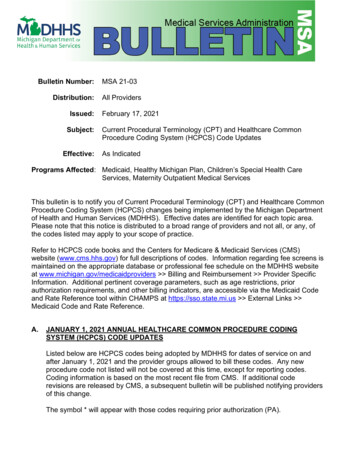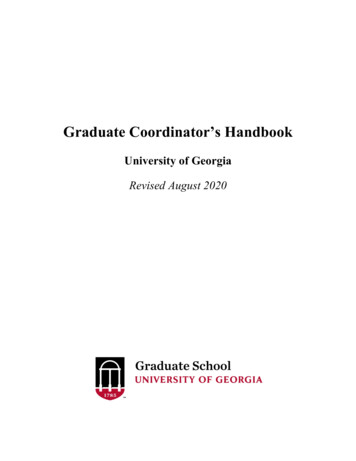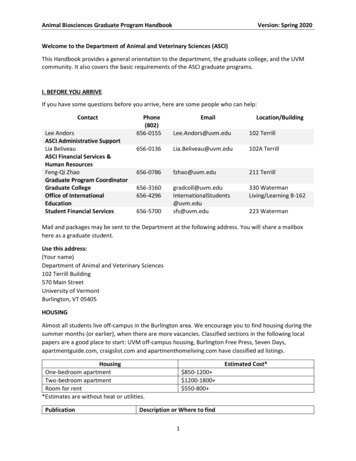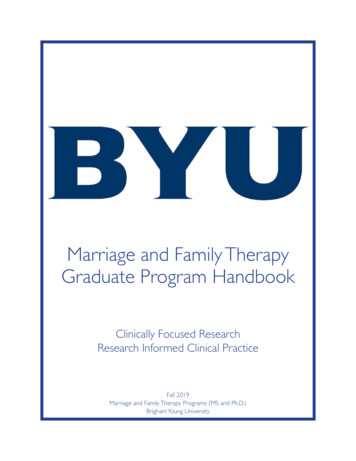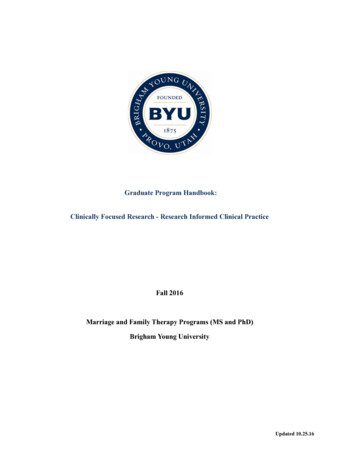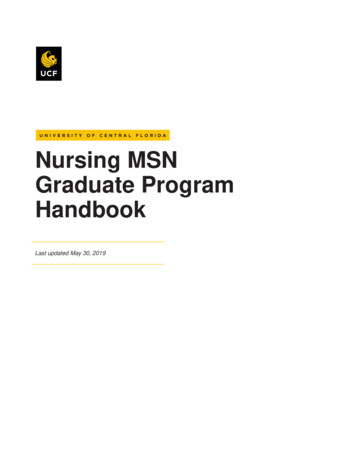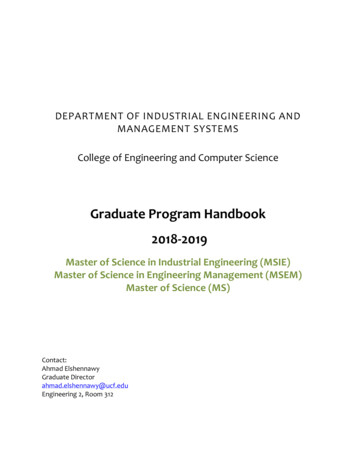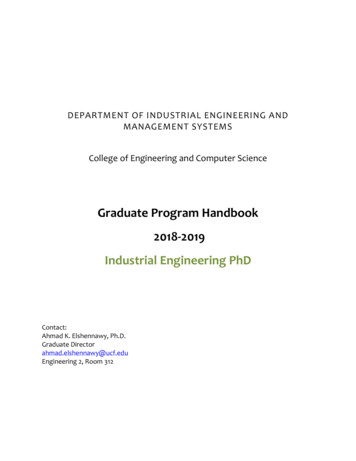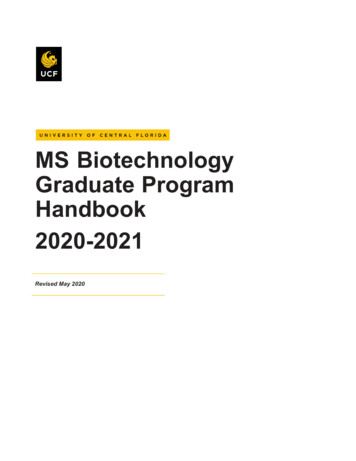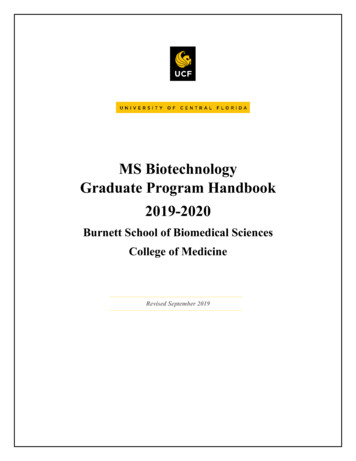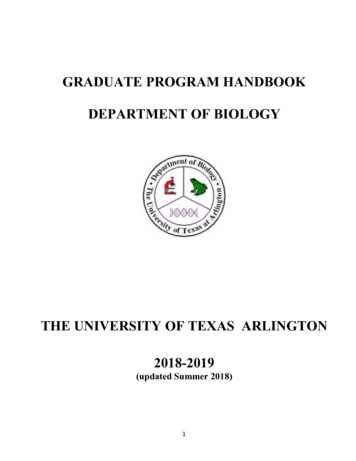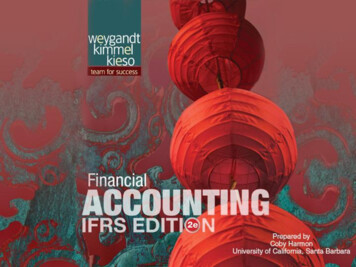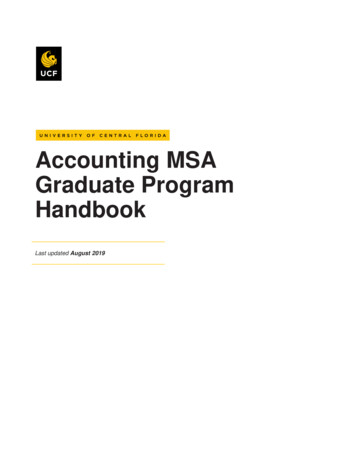
Transcription
Accounting MSAGraduate ProgramHandbookLast updated August 2019
Table of ContentsIntroduction .1Curriculum .1Timeline for Completion .11st Year.1Examination Requirements .1Graduate Research .4Financial Support .4Graduate Student Associations .5Professional Development .5Executive Development Center .5Faculty Center for Teaching and Learning .6Pathways to Success Workshops .6Graduate Research Forum .6Graduate Excellence Awards .6Other .7Job Search .7Forms .7Useful Links .7Graduate Faculty .8Contact Info .9Accounting MSA Program Handbooki
Master of Science in AccountingThe Master of Science in Accounting (MSA) degree is awarded upon satisfactory completion of a minimum of 30credit hours and passing the end-of-program comprehensive exam. In the total plan of study a minimum of 21credit hours of the course work must be completed in accounting/tax courses. Students, with the assistance andapproval of the program adviser, may select other courses that reflect their interests.Total Credit Hours Required30 Credit Hours Minimum beyond the Bachelor's DegreeIntroductionThe Master of Science in Accounting (MSA) program prepares students for careers as professional accountantsand consultants in public accounting, industry, financial institutions, and government & nonprofit organizations.The MSA degree, along with the appropriate prerequisite work from an undergraduate degree in accounting,helps satisfy the education requirements to become a licensed CPA in the state of Florida.CurriculumPlease visit the Graduate Catalog to see the current curriculum for our program.Timeline for CompletionThis program can be completed on a full or part-time basis. The following is a sample schedule for completion ofthe program requirements on a full-time basis.1st YearFall SpringACG 6415 AdvancedAccounting InformationSystems (3 credits)TAX 5015 Advanced TaxTopics (3 credits)Restricted Accounting Elective1 (3 credits)Restricted Elective 1 (3credits)Semester Total: 12 credit hours ACG 6636 AdvancedAuditing (3 credits)ACG 6805 AccountingTheory (3 credits)Restricted AccountingElective 2 (3 credits)Restricted Elective 2(3 credits)Semester Total: 12 credit hoursSummer ACG 6305: AdvancedManagerial Accounting(3)Restricted Elective 3 (3credits)Semester Total: 6For the program’s required and elective course schedule, please consult with the Program Advisor.Examination RequirementsThe satisfactory completion of an end-of-program comprehensive written examination is required.Professional ConductStudents are expected to adhere to the rules and regulations as stipulated by the University of Central Florida andthe program handbook. Professionalism encompasses behaviors and qualities that are expected of graduateAccounting MSA Program Handbook1
business students in both the academic setting and in the business world. University of Central Florida College ofBusiness degrees begin at the time of program application; therefore, professional conduct is assessed from thatpoint forward.Attendance, timeliness, and attire are all reflections of professionalism. In the assessment of professionalism,instructors and program administrators will consider each student’s conduct; the quality of interactions; tone oforal and written communication; language; meaningful engagement in all aspects of the program; and substantivecontribution to class discussions. Students who are in violation of these behaviors will be counseled and remindedof UCF/EDC expectations. In such events, the faculty or program administrators may conclude that the student isnot able or willing to demonstrate an acceptable standard of professionalism. Repeated disregard or violation ofthese behaviors will lead to dismissal from the program. Some of the criteria by which a student’s professionaldemeanor is measured are below. Civility: Students are expected to behave in a respectful and courteous manner to instructors, fellow students,guest speakers, college and university administrators, EDC staff, and other UCF Staff. Examples of respectfulbehavior include but are not limited to modulated tone of voice; professional language that avoidsinappropriate, vulgar, or foul expressions; maintaining control of emotions and avoiding threatening or bullyingbehaviors; respect for others’ personal space; respect for EDC and UCF property; refraining from distractingand disruptive behaviors while on campus (EDC or other UCF campuses), in hallways and in classrooms; anda generally civil demeanor.Attendance: It is required for students to attend each lecture and comply with the instructor’s attendancepolicy as stated in the course syllabus.Timeliness: Students are expected to regularly arrive in class on time and to comply with each instructor’stardiness policy as stated in the course syllabus.Use of Technology: The use of computers, cell phones, or electronic devices during class that are unrelatedto course activities or not permitted by instructors (i.e., web searches, IMs, etc.) is considered unprofessional.Use of Electronic Media: As per Florida Law (§ 934.03) it is illegal to audio or video record any interaction withanother individual without their explicit consent. This includes lectures, meetings with instructors, meetingswith fellow students, or any situation involving EDC staff or UCF personnel.Professional Attire: Refers to a minimum of business casual that may include pants, khakis, dress shirts,skirts, dresses, and jeans free of rips/tears/fraying that are neat and clean. Note that clothes that arerevealing (plunging necklines, tank tops, open midriffs, short skirts/shorts, sheer fabrics); offensive T-shirts;sweatpants, leggings, workout clothes; thongs/flip-flops/Croc-like sandals; and overpoweringperfumes/colognes can be distracting or annoying to others.Guest Speakers / Presentations: The program often invites guest speakers from the local businesscommunity. Students in the program must demonstrate professional conduct, respect, and appreciation forthese professionals’ donation of their time to enrich students’ educational experiences. Students are expectedto arrive to class on time and be attentive as a sign of appreciation for their time. Professional business attireis required when guest speakers are present.Grading Policies and ExpectationsEach student’s academic progress is reviewed by both the College of Business and the College of GraduateStudies each semester. Students who have not met conditions or restrictions of their admission may be prohibitedfrom further study in the program. Additionally, students who have not performed to academic standards of theprogram or university will be placed on Probationary Status or Dismissed from the program.In accordance with the College of Graduate Studies’ Policies and with the minimum university standards forsatisfactory performance to continue graduate study, the College of Business graduate programs maintain thefollowing requirements for all business graduate students: Students must maintain a GPA* of at least 3.0 or higher in order to maintain regular graduate student status,receive financial assistance, and qualify for graduation.Accounting MSA Program Handbook2
Students are not permitted to get more than two “C” grades (C, C , C-).A course in which a student has received an unsatisfactory grade may be repeated; however both grades willbe used in computing the GPA. The opportunity to re-take courses is at the discretion of the College ofBusiness.A minimum grade of B- is required in the capstone course, MAN 6721 Applied Business Strategy and Policy.Students admitted on Restricted Admission due to earning 70% on admission modules must earn a grade ofB or higher in all courses in their initial semester.Grade Policy comparison ChartCollege of Graduate StudiesGrade PoliciesCollege of BusinessGrade PoliciesGPA3.0 minimum GPA ; 3.0 will be puton Academic Probation3.0 minimum GPA; 3.0 will be put onAcademic ProbationAcademic Probation9 credit hours of Academic Probation9 credit hours of Academic Probation“D” and “F” gradesUnsatisfactory grade; Course may berepeatedUnsatisfactory grade; Cause fordismissal“C” gradesMaximum of 6 credits of “C” gradesusable towards degree programMaximum of 6 credits of “C” gradesusable towards degree program;more than 6 credit hours is cause fordismissalCapstone CourseGradeA minimum grade of B- is required inthe capstone course, MAN 6721RestrictedAdmissionB grades or higher in all courses inthe initial semester for students whoearned 70% on admission modulesProbation and Dismissal Policy and ProcessProbationary Status in the programs means that the student is at risk (academic, professional, or ethical) withinthe program. A student cannot graduate from the program while on probationary status.A student may be placed on Probation if any of the following occur: Academic Probation: Per College of Graduate Studies’ policy, if the graduate status GPA falls below therequired 3.00, the student will have 9 credit hours to bring the GPA above a 3.00 in order to have theAcademic Probation removed. Students will receive notice in writing from the College of GraduateStudies.Conduct Probation: Any minor violation of the aforementioned professional conduct expectations. Theseverity of violation will be determined by the procedures outlined in the following section.Conduct Violation Process:1. If a violation of a conduct policy occurs, it will be reported to the Associate Dean. This will be submitted inwriting and shared with the Director of the EDC.Accounting MSA Program Handbook3
2. Program Director will evaluate the matter and determine an appropriate course of action ranging fromwritten warning to convening the Master’s Program Review Committee (MPRC) for evaluation toimmediate dismissal based on the egregiousness of the violation.3. If the MPRC is convened, member will discuss the student’s academic progress and/or professionalconduct when concerns arise and recommend appropriate action based on the severity of violation up toand including program dismissal.A student may be dismissed if any of the following occur:The following may be grounds for dismissal from the program. Receiving a “D” or “F” grade in a course listed as a part of the program’s curriculum. The student will besummarily dismissed from the program at that time.Failure to achieve 3.0 GPA after 9 credit hours of Academic Probation.Receiving more than 6 credit hours of “C” grades. Exceeding this limit is reason for dismissal from theprogram.Students on Restricted Admission due to earning 70% on admission modules that do not achieve agrade of B or higher in all courses in the initial semester will be dismissed.Cheating: Which includes plagiarizing of materials from previously published sources or previouslysubmitted course assignments. Students will not discuss the content of written or oral examinations untilcleared to do so by the course instructor. See Golden Rule, UCF’s Student Handbook- Rules of Conduct.Unprofessional behavior: Behavior that is inconsistent with the aforementioned expected professionalismor failure to correct unprofessional behavior as defined by the program handbook is grounds for dismissalfrom the program. This includes failure to attend classes or excessive unexcused absences, or repeatedlateness.*all references to GPA refers Graduate Status Grade Point Average. A graduate status GPA will be calculatedbased on the graduate courses taken at UCF since admission into each degree or certificate program. See UCFGraduate Catalog for more information: http://catalog.ucf.edu/content.php?catoid 4&navoid 201#grade-systemGraduate ResearchUCF has three fundamental responsibilities with regard to graduate student research. They are to (1) support anacademic environment that stimulates the spirit of inquiry, (2) develop the intellectual property stemming fromresearch, and (3) disseminate the intellectual property to the general public. Students are responsible for beinginformed of rules, regulations and policies pertaining to research. Below are some general policies and resources.Research Policies and Ethics Information: UCF's Office of Research & Commercialization ensures the UCFcommunity complies with local, state and federal regulations that relate to research. For polices including requiredInstitutional Review Board (IRB) approval when conducting research involving human subjects (e.g. surveys),animal research, conflict of interest and general responsible conduct of research, please see their website:research.ucf.edu/ Compliance.UCF’s Patent and Invention Policy: In most cases, UCF owns the intellectual property developed usinguniversity resources. The graduate student as inventor will according to this policy share in the proceeds of theinvention. Please see the current UCF Graduate Catalog for details: graduatecatalog.ucf.edu Policies GeneralGraduate Policies.Financial SupportStudents with qualifying assistantships or university-wide fellowships will receive financial packages that includean assistantship or fellowship stipend, tuition remission, and health insurance. Qualifying fellowships areaccompanied by tuition waivers. Qualifying assistantships include single appointments of at least .50 FTE (20hrs/week) or two appointments of at least .25 FTE (10 hrs/week). Tuition remission is in the form of either tuitionAccounting MSA Program Handbook4
waivers or tuition payments that cover in-state (resident) tuition. Non-resident students with financial packagesare not charged out-of-state tuition or the non-resident financial aid fee.For additional information about funding for graduate school, please visit funding.graduate.ucf.edu/.Key points about financial support: If you are interested in financial assistance, you are strongly encouraged to apply for admission early.A complete application for admission, including all supporting documents, must be received by thepriority date listed for your program under "Admissions."You must be admitted to a graduate program before the university can consider awarding financialassistance to you.If you want to be considered for loans and other need-based financial assistance, review the UCFStudent Financial Assistance website at finaid.ucf.edu and complete the FAFSA (Free Application forFederal Student Aid) form, which is available online at fafsa.ed.gov/. Apply early and allow up to sixweeks for the FAFSA form to be processed.For information on assistantships (including teaching, research, and general graduate assistantships)or tuition support, contact the graduate program director of your major.For more information on scholarships for the discipline, visit the College of Business Administration website.Graduate Student AssociationsBeta Alpha Psi is the premiere national honors organization for financial information students and professionals.The primary objective of Beta Alpha Psi is to encourage and give recognition to scholastic and professionalexcellence in the business information field. This includes promoting the study and practice of accounting, financeand information systems; providing opportunities for self-development, service and association among membersand practicing professionals, and encouraging a sense of ethical, social, and public responsibility. bapucf.com/The Student Accounting Society (SAS) at the University of Central Florida is a professional organization thatencourages students to learn about the various career opportunities available within the field of accounting.Members of the Student Accounting Society meet with accounting professionals on a weekly basis to learn aboutvarious subjects, including career paths, resumes, interviewing, internships, and more. Aside from professionaldevelopment, the Student Accounting Society provides members with networking opportunities with students andfaculty and tutoring in accounting classes. ingsocietyFor a listing of other student organizations associated with the business disciplines visit the Student Organizationswebpage on the College of Business Administration website.The Graduate Student Association (GSA) is UCF’s graduate organization committed to enrich graduatestudents’ personal, educational and professional experience. To learn more or get involved, please visitfacebook.com/groups/UCFgsa/.Professional DevelopmentFor information on career management, internship and job placement services for MBA and graduate businessstudents visit the Office of Professional Development Website on the College of Business Administration website.Executive Development CenterThe Executive Development Center offers programs that range from broad-based professional development totopic-specific workshops. Distinguished UCF faculty and leading practitioners teach these certificate and nondegree programs that train participants in the areas of branding, finance, leadership, and strategy. For additionalinformation, please visit ive-development-center/.Accounting MSA Program Handbook5
Faculty Center for Teaching and LearningThe Faculty Center for Teac
The Master of Science in Accounting (MSA) degree is awarded upon satisfactory completion of a minimum of 30 credit hours and passing the end-of-program comprehensive exam. In the total plan of study a minimum of 21 credit hours of the course work must be completed in accounting/tax courses. Students, with the assistance and
